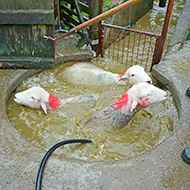Concerns raised over sheep dip disposal

Sheep scab is estimated to cost the sheep industry more than £78-200m annually.
The National Sheep Association (NSA) Cymru/Wales Region has expressed concern over proposals to increase the fees associated with the disposal of Organophosphate (OP) dips.
Late last year, Natural Resources Wales launched a consultation on increases to its regulatory charges, which will come into force from April 2023, subject to Welsh Government approval.
Commenting on the proposals, NSA Cymru/Wales development officer, Helen Roberts, said: “NSA Cymru believes there is a basic lack of evidence and clarity for many of the charge increases proposed in the present consultation. Indeed, it is a source of frustration that no attempt was made to provide a breakdown of current costs to allow the industry to properly evaluate the proposed increases and to determine where value for money is - or is not - being provided to the sector.
“Furthermore, no impact assessment has been conducted on the additional financial burden placed upon livestock keepers resulting from the proposed changes, and NSA Cymru believes that this was a necessary and important inclusion.”
OP dips are widely regarded as the most effective treatment to control the prevalence of sheep scab, a disease estimated to cost the sheep industry more than £78-200m annually, according to the NSA.
Rural affairs minister Lesley Griffiths recently announced that Coleg Sir Gar, a Welsh Further Education institution, would be awarded a three-year contract from the Welsh Government to focus on eradicating Sheep Scab in Wales.
Ms Griffith stated that ‘Sheep Scab is one of the most contagious diseases of sheep and a difficult challenge for the industry’ and that ‘Effective control of sheep scab, both on a local and national scale is essential. Sheep must be scab-free to be productive and to have a good quality of life.’
NSA Cymru Chair, Kate Hovers, said: “OP dips are a vital tool in ensuring animal health and welfare, and plunge dipping is acknowledged as the most effective treatment to control the prevalence of sheep scab and other external parasites.
"OP dips also control ticks and lice, both are which are an irritant to sheep. Ticks can also transmit Lyme disease, which is an increasing human health issue, and can destroy grouse populations and have a devastating effect on other wildlife species”.
In its response to the consultation, NSA outlined the ongoing work of the Wales Sheep Scab Group, and highlighted a variety of long-term sustainable alternatives to address the disease in Wales.
However, owing to the time it will take to deliver these alternatives, NSA is urging NRW to consider a moratorium on the proposed land spreading permit to support the sheep scab eradication programme and associated research.



 The Federation of Independent Veterinary Practices (FIVP) has announced a third season of its podcast, Practice Matters.
The Federation of Independent Veterinary Practices (FIVP) has announced a third season of its podcast, Practice Matters.